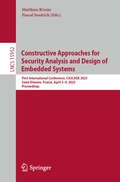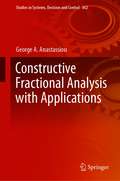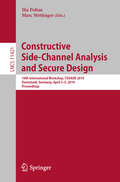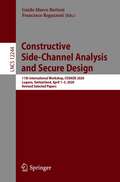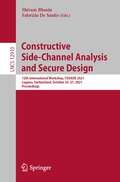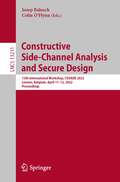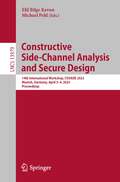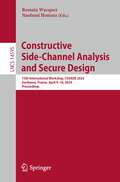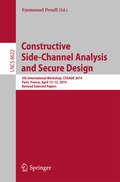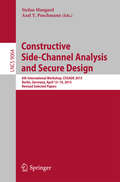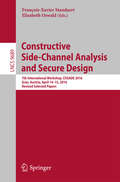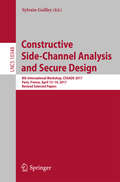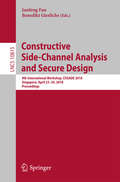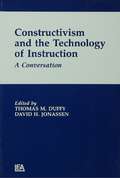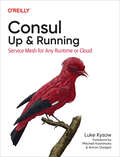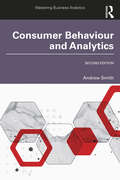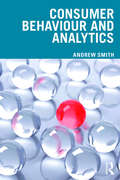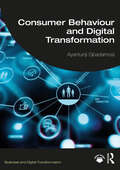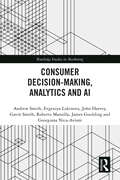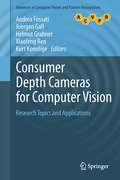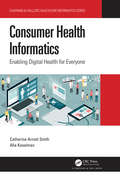- Table View
- List View
Constructive Approaches for Security Analysis and Design of Embedded Systems: First International Conference, CASCADE 2025, Saint-Etienne, France, April 2–4, 2025, Proceedings (Lecture Notes in Computer Science #15952)
by Matthieu Rivain Pascal SasdrichThis book constitutes the refereed proceedings of the First International Conference on Constructive Approaches for Security Analysis and Design of Embedded Systems, CASCADE 2025, held in Saint-Etienne, France, during April 2–4, 2025.The 24 full papers included in this book were carefully reviewed and selected from 51 submissions. They are organized in topical sections as follows: Attacks on Symmetric Cryptography; Side-Channel Attacks; Physical Security; RISC-V; Machine Learning; Attacks on Post-Quantum Cryptography; Securing Post-Quantum Cryptography; Homomorphic Encryption and White-Box Cryptography; Attacks on Symmetric Cryptography; Side-Channel Attacks; Physical Security; RISC-V; and Machine Learning.
Constructive Fractional Analysis with Applications (Studies in Systems, Decision and Control #362)
by George A. AnastassiouThis book includes constructive approximation theory; it presents ordinary and fractional approximations by positive sublinear operators, and high order approximation by multivariate generalized Picard, Gauss–Weierstrass, Poisson–Cauchy and trigonometric singular integrals. Constructive and Computational Fractional Analysis recently is more and more in the center of mathematics because of their great applications in the real world. In this book, all presented is original work by the author given at a very general level to cover a maximum number of cases in various applications. The author applies generalized fractional differentiation techniques of Riemann–Liouville, Caputo and Canavati types and of fractional variable order to various kinds of inequalities such as of Opial, Hardy, Hilbert–Pachpatte and on the spherical shell. He continues with E. R. Love left- and right-side fractional integral inequalities. They follow fractional Landau inequalities, of left and right sides, univariate and multivariate, including ones for Semigroups. These are developed to all possible directions, and right-side multivariate fractional Taylor formulae are proven for the purpose. It continues with several Gronwall fractional inequalities of variable order. This book results are expected to find applications in many areas of pure and applied mathematics. As such this book is suitable for researchers, graduate students and seminars of the above disciplines, also to be in all science and engineering libraries.
Constructive Side-Channel Analysis and Secure Design: 10th International Workshop, COSADE 2019, Darmstadt, Germany, April 3–5, 2019, Proceedings (Lecture Notes in Computer Science #11421)
by Ilia Polian Marc StöttingerThis book constitutes revised selected papers from the 10th International Workshop on Constructive Side-Channel Analysis and Secure Design, COSADE 2019, held in Darmstadt, Germany, in April 2019. The 14 papers presented together with one keynote and one invited talk in this volume were carefully reviewed and selected from 34 submissions. They were organized in topical sections named: Side-Channel Attacks; Fault-Injection Attacks; White-Box Attacks; Side-Channel Analysis Methodologies; Security Aspects of Post-Quantum Schemes; and Countermeasures Against Implementation Attacks.
Constructive Side-Channel Analysis and Secure Design: 11th International Workshop, COSADE 2020, Lugano, Switzerland, April 1–3, 2020, Revised Selected Papers (Lecture Notes in Computer Science #12244)
by Francesco Regazzoni Guido Marco BertoniThis book constitutes revised selected papers from the 11th International Workshop on Constructive Side-Channel Analysis and Secure Design, COSADE 2020, held in Lugano, Switzerland, in April 2020. Due to COVID-19, the workshop was held online. The 15 papers presented in this volume were carefully reviewed and selected from 36 submissions. The workshop covers subjects from wide ranges such as secure design, side channel attacks and countermeasures, and architectures and protocols.
Constructive Side-Channel Analysis and Secure Design: 12th International Workshop, COSADE 2021, Lugano, Switzerland, October 25–27, 2021, Proceedings (Lecture Notes in Computer Science #12910)
by Shivam Bhasin Fabrizio De SantisThis book constitutes revised selected papers from the 11th International Workshop on Constructive Side-Channel Analysis and Secure Design, COSADE 2021, held in Lugano, Switzerland, in October 2021.The 14 full papers carefully reviewed and selected from 31 submissions are presented in this volume together with the 4 extended keynote abstracts. The workshop covers the following subjects: cryptography, side-channel analysis, cryptographic implementations, fault attacks, implementation attacks, post-quantum cryptography, hardware accelerators, etc.
Constructive Side-Channel Analysis and Secure Design: 13th International Workshop, COSADE 2022, Leuven, Belgium, April 11-12, 2022, Proceedings (Lecture Notes in Computer Science #13211)
by Colin O’Flynn Josep BalaschThis book constitutes revised selected papers from the 13th International Workshop on Constructive Side-Channel Analysis and Secure Design, COSADE 2022, held in Leuven, Belgium, in April 2022. The 12 full papers presented in this volume were carefully reviewed and selected from 25 submissions. The papers cover the following subjects: implementation attacks, secure implementation, implementation attack-resilient architectures and schemes, secure design and evaluation, practical attacks, test platforms, and open benchmarks.
Constructive Side-Channel Analysis and Secure Design: 14th International Workshop, COSADE 2023, Munich, Germany, April 3–4, 2023, Proceedings (Lecture Notes in Computer Science #13979)
by Elif Bilge Kavun Michael PehlThis book constitutes the refereed proceedings of the 14th International Workshop on Constructive Side-Channel Analysis and Secure Design, COSADE 2023, held in Munich, Germany, during April 3–4, 2023. The 12 full papers included in this book were carefully reviewed and selected from 28 submissions. They were organized in topical sections as follows: fault-injection analyses and countermeasures; side-channel analyses and countermeasures; attacks on PQC and countermeasure; and analyses and tools.
Constructive Side-Channel Analysis and Secure Design: 15th International Workshop, COSADE 2024, Gardanne, France, April 9–10, 2024, Proceedings (Lecture Notes in Computer Science #14595)
by Romain WacquezThis book constitutes the refereed proceedings of the 15th International Workshop on Constructive Side-Channel Analysis and Secure Design, COSADE 2024, held in Gardanne, France, during April 9–10, 2024. The 14 full papers included in this book were carefully reviewed and selected from 42 submissions. They were organized in topical sections as follows: Analyses and Tools; Attack Methods; Deep-Learning-Based Side-Channel Attacks; PUF/RNG; and Cryptographic Implementations.
Constructive Side-Channel Analysis and Secure Design: 5th International Workshop, COSADE 2014, Paris, France, April 13-15, 2014. Revised Selected Papers (Lecture Notes in Computer Science #8622)
by Emmanuel ProuffThis book constitutes the thoroughly refereed post-conference proceedings of the 5th International Workshop, COSADE 2014, held in Paris, France, in April 2014. The 20 revised full papers presented together with two invited talks were carefully selected from 51 submissions and collect truly existing results in cryptographic engineering, from concepts to artifacts, from software to hardware, from attack to countermeasure.
Constructive Side-Channel Analysis and Secure Design: 6th International Workshop, COSADE 2015, Berlin, Germany, April 13-14, 2015. Revised Selected Papers (Lecture Notes in Computer Science #9064)
by Stefan Mangard Axel Y. PoschmannThis book constitutes the thoroughly refereed post-conference proceedings of the 6th International Workshop, COSADE 2015, held in Berlin, Germany, in April 2015. The 17 revised full papers presented were carefully selected from 48 submissions. the focus of this workshop was on following topics: side-channel attacks, FPGA countermeasures, timing attacks and countermeasures, fault attacks, countermeasures, and Hands-on Side-channel analysis.
Constructive Side-Channel Analysis and Secure Design: 7th International Workshop, COSADE 2016, Graz, Austria, April 14-15, 2016, Revised Selected Papers (Lecture Notes in Computer Science #9689)
by François-Xavier Standaert Elisabeth OswaldThis book constitutes revised selected papers from the 7th International Workshop on Constructive Side-Channel Analysis and Secure Design, COSADE 2016, held in Graz, Austria, in April 2016. The 12 papers presented in this volume were carefully reviewed and selected from 32 submissions. They were organized in topical sections named: security and physical attacks; side-channel analysis (case studies); fault analysis; and side-channel analysis (tools).
Constructive Side-Channel Analysis and Secure Design: 8th International Workshop, COSADE 2017, Paris, France, April 13-14, 2017, Revised Selected Papers (Lecture Notes in Computer Science #10348)
by Sylvain GuilleyThis book constitutes revised selected papers from the 8th International Workshop on Constructive Side-Channel Analysis and Secure Design, COSADE 2017, held in Paris, France, in April 2017. The 17 papers presented in this volume were carefully reviewed and selected from numerous submissions. They were organized in topical sections named: Side-Channel Attacks and Technological Effects; Side-Channel Countermeasures; Algorithmic Aspects in Side-Channel Attacks; Side-Channel Attacks; Fault Attacks; Embedded Security; and Side-Channel Tools.
Constructive Side-Channel Analysis and Secure Design: 9th International Workshop, COSADE 2018, Singapore, April 23–24, 2018, Proceedings (Lecture Notes in Computer Science #10815)
by Benedikt Gierlichs Junfeng FanThis book constitutes revised selected papers from the 9th International Workshop on Constructive Side-Channel Analysis and Secure Design, COSADE 2018, held in Singapore, in April 2018.The 14 papers presented in this volume were carefully reviewed and selected from 31 submissions. They were organized in topical sections named: countermeasures against side-channel attacks; tools for side-channel analysis; fault attacks and hardware trojans; and side-channel analysis attacks.
Constructivism and the Technology of Instruction: A Conversation
by David H. Jonassen Thomas M. DuffyThis book is about the implications of constructivism for instructional design practices, and more importantly, it is about a dialogue between instructional developers and learning theorists. Working with colleagues in each discipline, the editors were amazed to find a general lack of familiarity with each others' work. From an instructional design perspective, it seems that the practice of instructional design must be based on some conception of how people learn and what it means to learn. From a learning theory perspective, it seems obvious that the value of learning theory rests in the ability to predict the impact of alternative learning environments or instructional practices on what is learned. Thus the interchange of ideas between these disciplines is essential. As a consequence of both the information rich environment and the technological capability, business is seen moving away from a fixed curriculum and toward providing information and instruction when it is needed. These changes bring about a window of opportunity establishing a dialogue that will provide for a richer understanding of learning and the instructional environment required to achieve that learning. The editors hope that this book is the beginning of the conversation and that it will serve to spur continued conversation between those involved in learning theory and those involved in the design of instruction.
Consul: Service Mesh for Any Runtime or Cloud
by Luke KysowWith the advent of microservices, Kubernetes, public cloud, and hybrid computing, site reliability and DevOps engineers are facing more complexity than ever before. Service mesh is an exciting new technology that promises to help tackle this complexity. A service mesh provides you with a unified control plane to manage application networking across these distinct platforms. With this definitive guide, you'll learn how to automate networking for simple and secure application delivery with Consul. Author Luke Kysow, Consul engineer at HashiCorp, demonstrates how this service mesh solution provides a software-driven approach to security, observability, reliability, and traffic management. Once you learn how to deploy Consul on multiple platforms, you'll be able to take control of application traffic, prevent outages, view metrics, integrate with legacy systems, and more. Dive into the characteristics of service meshes, zero trust networking, and traffic-shaping patternsDeploy Consul on Kubernetes and virtual machinesLearn how to secure, monitor, and manage your application traffic with ConsulUse this guide to deploy and operate applications as a platform operator, DevOps engineer, or developer
Consumer Activism: Promotional Culture and Resistance
by Eleftheria J Lekakis"A crucial intervention to both critical studies of consumption and research into activism. It authoritatively explores the complex and multiplying links between branding and neoliberal culture, consumer practices and social justice." – Professor Mehita Iqani, Stellenbosch University "Eleftheria Lekakis reminds us that as consumers, we can do much more than just buy our way out of social or political problems." – Professor Melissa Aronczyk, Rutgers University Consumption and resistance are entwined. From buying fair-trade, to celebrity advocates for social causes, to subvertising and anti-consumerist grassroots movements, consumer activism is now a key part of our fight for social and environmental justice. This book is a comprehensive exploration of the complexities and dilemmas of using the marketplace as an arena for politics. It goes beyond simply buying or boycotting to critically explore how individuals, collectives, corporations and governments do politics with and through consumption. Impassioned and always accessible, Eleftheria Lekakis explores: The media and economic logics which privilege elite activists. The real opportunities to resist and redirect promotional culture. Consumer activism as collective and community-building. The politicisation of celebrity influencers. The centrality of digital media technology. A range of transnational case studies pushing the field beyond the Global North. Consumer Activism: Promotional Culture and Resistance covers the full breadth of theory and practice you need to know. It is an essential resource for understanding, researching and engaging with the global phenomenon of consumer activism. Dr Eleftheria Lekakis is senior lecturer in Media and Communications at the School of Media, Arts, and Humanities at the University of Sussex.
Consumer Activism: Promotional Culture and Resistance
by Eleftheria J Lekakis"A crucial intervention to both critical studies of consumption and research into activism. It authoritatively explores the complex and multiplying links between branding and neoliberal culture, consumer practices and social justice." – Professor Mehita Iqani, Stellenbosch University "Eleftheria Lekakis reminds us that as consumers, we can do much more than just buy our way out of social or political problems." – Professor Melissa Aronczyk, Rutgers University Consumption and resistance are entwined. From buying fair-trade, to celebrity advocates for social causes, to subvertising and anti-consumerist grassroots movements, consumer activism is now a key part of our fight for social and environmental justice. This book is a comprehensive exploration of the complexities and dilemmas of using the marketplace as an arena for politics. It goes beyond simply buying or boycotting to critically explore how individuals, collectives, corporations and governments do politics with and through consumption. Impassioned and always accessible, Eleftheria Lekakis explores: The media and economic logics which privilege elite activists. The real opportunities to resist and redirect promotional culture. Consumer activism as collective and community-building. The politicisation of celebrity influencers. The centrality of digital media technology. A range of transnational case studies pushing the field beyond the Global North. Consumer Activism: Promotional Culture and Resistance covers the full breadth of theory and practice you need to know. It is an essential resource for understanding, researching and engaging with the global phenomenon of consumer activism. Dr Eleftheria Lekakis is senior lecturer in Media and Communications at the School of Media, Arts, and Humanities at the University of Sussex.
Consumer Attitudes Toward Data Breach Notifications and Loss of Personal Information
by Paul Heaton Lillian Ablon Sasha Romanosky Diana Catherine LaveryAlthough spending on cybersecurity continues to grow, companies, government agencies, and nonprofit organizations are still being breached, and sensitive personal, financial, and health information is still being compromised. This report sets out the results of a study of consumer attitudes toward data breaches, notifications that a breach has occurred, and company responses to such events.
Consumer Behaviour and Analytics (Mastering Business Analytics Ser.)
by Andrew SmithThe second edition of Consumer Behaviour and Analytics provides a consumer behaviour textbook for the new marketing reality. In a world of Big Data, machine learning and artificial intelligence, this key text reviews the issues, research and concepts essential for navigating this new terrain. It demonstrates how we can use data-driven insight and merge this with insight from extant research to inform knowledge-driven decision-making. Adopting a practical and managerial lens, while also exploring the rich lineage of academic consumer research, this textbook approaches its subject from a refreshing and original standpoint. It contains numerous accessible examples, scenarios and exhibits, and condenses the disparate array of relevant work into a workable, coherent, synthesized and readable whole. Providing an effective tour of the concepts and ideas most relevant in the age of analytics-driven marketing (from data visualization to semiotics), the book concludes with an adaptive structure to inform managerial decision-making. Consumer Behaviour and Analytics provides a unique distillation from a vast array of social and behavioural research merged with the knowledge potential of digital insight. It offers an effective and efficient summary for undergraduate, postgraduate or executive courses in consumer behaviour and marketing analytics, and also functions as a supplementary text for other marketing modules. Online resources include PowerPoint slides.
Consumer Behaviour and Analytics: Data Driven Decision Making
by Andrew SmithConsumer Behaviour and Analytics provides a consumer behaviour textbook for the new marketing reality. In a world of Big Data, machine learning and AI, this key text reviews the issues, research and concepts essential for navigating this new terrain. It demonstrates how we can use data-driven insight and merge this with insight from extant research to inform knowledge-driven decision making. Adopting a practical and managerial lens, while also exploring the rich lineage of academic consumer research, this textbook approaches its subject from a refreshing and original standpoint. It contains numerous accessible examples, scenarios and exhibits and condenses the disparate array of relevant work into a workable, coherent, synthesized and readable whole. Providing an effective tour of the concepts and ideas most relevant in the age of analytics-driven marketing (from data visualization to semiotics), the book concludes with an adaptive structure to inform managerial decision making. Consumer Behaviour and Analytics provides a unique distillation from a vast array of social and behavioural research merged with the knowledge potential of digital insight. It offers an effective and efficient summary for undergraduate, postgraduate or executive courses in consumer behaviour and marketing analytics or a supplementary text for other marketing modules.
Consumer Behaviour and Digital Transformation (Business and Digital Transformation)
by Ayantunji GbadamosiThis comprehensive textbook explores how technological developments and emerging technologies impact on, and engage with, consumer behaviour and decision making globally. The book will enable readers to develop a coherent understanding of the basic underpinnings of consumer behaviour as they relate to individual and group-oriented consumption decisions, offering insight into how consumer behaviour, contemporary real-life situations, and digital technology are inextricably linked.Key learning objectives, exercises and activities, boxed examples and analytical frameworks facilitate and enrich students’ learning. Each chapter includes ‘pause, plan, and practice (PPP)’ activities, as well as real-life case studies exploring digital consumption, digital consumer experiences, and digital trends across industries, from global companies such as Nike and McDonald’s to the digital transformation of SMEs. Combining a thorough examination of traditional theory with a fresh approach to the impact of digital transformation on consumer behaviour, this textbook should be core reading for advanced undergraduate and postgraduate students studying Consumer Behaviour, Consumer Psychology, Customer Experience Management, and Digital Marketing.This book will be accompanied by online resources for the use of instructors, including PowerPoint slides and a test bank.
Consumer Decision-Making, Analytics and AI (Routledge Studies in Marketing)
by John Harvey Andrew Smith Gavin Smith James Goulding Evgeniya Lukinova Roberto Mansilla Georgiana Nica-AvramMany decisions in our lives are decisions we make as consumers and buyers. Analytics- driven marketing underpinned by machine learning and AI has had a seismic impact on the execution of these decisions and on behavioural outcomes. This book dissects processes and issues at the heart of our emerging reality as human actors embedded in a system of exchange driven by fast-evolving technologies. It is a seminal work on a complex but urgent issue in social and behavioural science.Based on extant and emerging research, the book presents new evidence and innovative theoretical structures and concepts to explore how data analytics and AI can influence consumer thinking and behaviour. It synthesizes consumer research with the relevant literature on computational ‘thinking,’ human– computer interaction, AI, decision delegation and consumer analytics, linking them in a coherent fashion. The authors utilize original exhibits and real- world data in an accessible format to both engage and challenge the reader.This cutting- edge book is a must- read for scholars and upper- level students researching and studying marketing, consumer behaviour, AI, decision-making and behavioural science.
Consumer Depth Cameras for Computer Vision: Research Topics and Applications (Advances in Computer Vision and Pattern Recognition)
by Andrea Fossati Helmut Grabner Kurt Konolige Juergen Gall Xiaofeng RenThe potential of consumer depth cameras extends well beyond entertainment and gaming, to real-world commercial applications. This authoritative text reviews the scope and impact of this rapidly growing field, describing the most promising Kinect-based research activities, discussing significant current challenges, and showcasing exciting applications. Features: presents contributions from an international selection of preeminent authorities in their fields, from both academic and corporate research; addresses the classic problem of multi-view geometry of how to correlate images from different viewpoints to simultaneously estimate camera poses and world points; examines human pose estimation using video-rate depth images for gaming, motion capture, 3D human body scans, and hand pose recognition for sign language parsing; provides a review of approaches to various recognition problems, including category and instance learning of objects, and human activity recognition; with a Foreword by Dr. Jamie Shotton.
Consumer Health Informatics: Enabling Digital Health for Everyone (Chapman & Hall/CRC Healthcare Informatics Series)
by Catherine Arnott Smith Alla Keselman"An engaging introduction to an exciting multidisciplinary field where positive impact depends less on technology than on understanding and responding to human motivations, specific information needs, and life constraints." -- Betsy L. Humphreys, former Deputy Director, National Library of Medicine This is a book for people who want to design or promote information technology that helps people be more active and informed participants in their healthcare. Topics include patient portals, wearable devices, apps, websites, smart homes, and online communities focused on health. Consumer Healthcare Informatics: Enabling Digital Health for Everyone educates readers in the core concepts of consumer health informatics: participatory healthcare; health and e-health literacy; user-centered design; information retrieval and trusted information resources; and the ethical dimensions of health information and communication technologies. It presents the current state of knowledge and recent developments in the field of consumer health informatics. The discussions address tailoring information to key user groups, including patients, consumers, caregivers, parents, children and young adults, and older adults. For example, apps are considered as not just a rich consumer technology with the promise of empowered personal data management and connectedness to community and healthcare providers, but also a domain rife with concerns for effectiveness, privacy, and security, requiring both designer and user to engage in critical thinking around their choices. This book’s unique contribution to the field is its focus on the consumer and patient in the context of their everyday life outside the clinical setting. Discussion of tools and technologies is grounded in this perspective and in a context of real-world use and its implications for design. There is an emphasis on empowerment through participatory and people-centered care.
Contabilidad Fácil Para Ebay
by Carlos Blanco Nick Vulich¿Serio acerca de su negocio en el Internet? Contabilidad Fácil para eBay es un iniciador financiero para los vendedores en el Internet. Lo ayudará a domar la bestia, para que Ud. pueda dejar de hacer malabares con sus recibos, los formularios de impuestos y el miedo a una auditoría del Servicio de Rentas Internas. El libro es como una Maestría en Administración de Empresas presentada en cortos y simples bytes. > He aquí una muestra de lo que Ud. aprenderá. > Eliminaremos el misterio de la contabilidad > Le daremos los términos básicos de negocio que Ud. necesita saber > Le ayudaremos a domar el monstruo que es GoDaddy Bookkeeping > Le ayudaremos a maniobrar en el laberinto de los impuestos, las licencias de negocio y las deducciones de negocio más comunes. Si UD. se ha preguntado alguna vez si puede tomar la deducción por usar su casa para negocios , reclamar los gastos por kilometraje por usar su carro para negocios; consideró deducir una nueva computadora, iPad o iPhone; o pensó acerca de deducir sus próximas vacaciones como un viaje de negocios. ¡No se preocupe! Se lo explicaremos todo. Y si vende en múltiples plataformas, también lo ayudaremos. Contabilidad Fácil para eBay aplica a vendedores de Amazon y de Etsy también. Recoja su copia hoy y aprenda como hacer crecer su negocio - ¡Un número detrás otro!:
